“These individuals that are here are warriors,” says Navajo Nation President Jonathan Nez. He’s talking about the team working alongside him at a COVID-19 awareness checkpoint in Tuba City, Arizona. But he’s also describing all Navajo first responders putting themselves in harm’s way.
Early in the pandemic, the Navajo Nation had one of the highest per capita rates of infection in the country, in part because roughly 40% of the population don’t have running water in their homes.
“If you get [the] CDC telling you to wash your hands with soap and water on a periodic basis and you don’t have much water, it’s pretty tough to push this virus back,” says President Nez.
He reminds people of their ancestors’ resilience as encouragement.
Other obstacles
Residents face other obstacles. The Navajo Nation spreads across 27,400 square miles in New Mexico, Arizona, and Utah, with much of the sparse population scattered in isolated pockets. Many lack electricity or internet access, which makes it difficult to get the latest coronavirus updates.
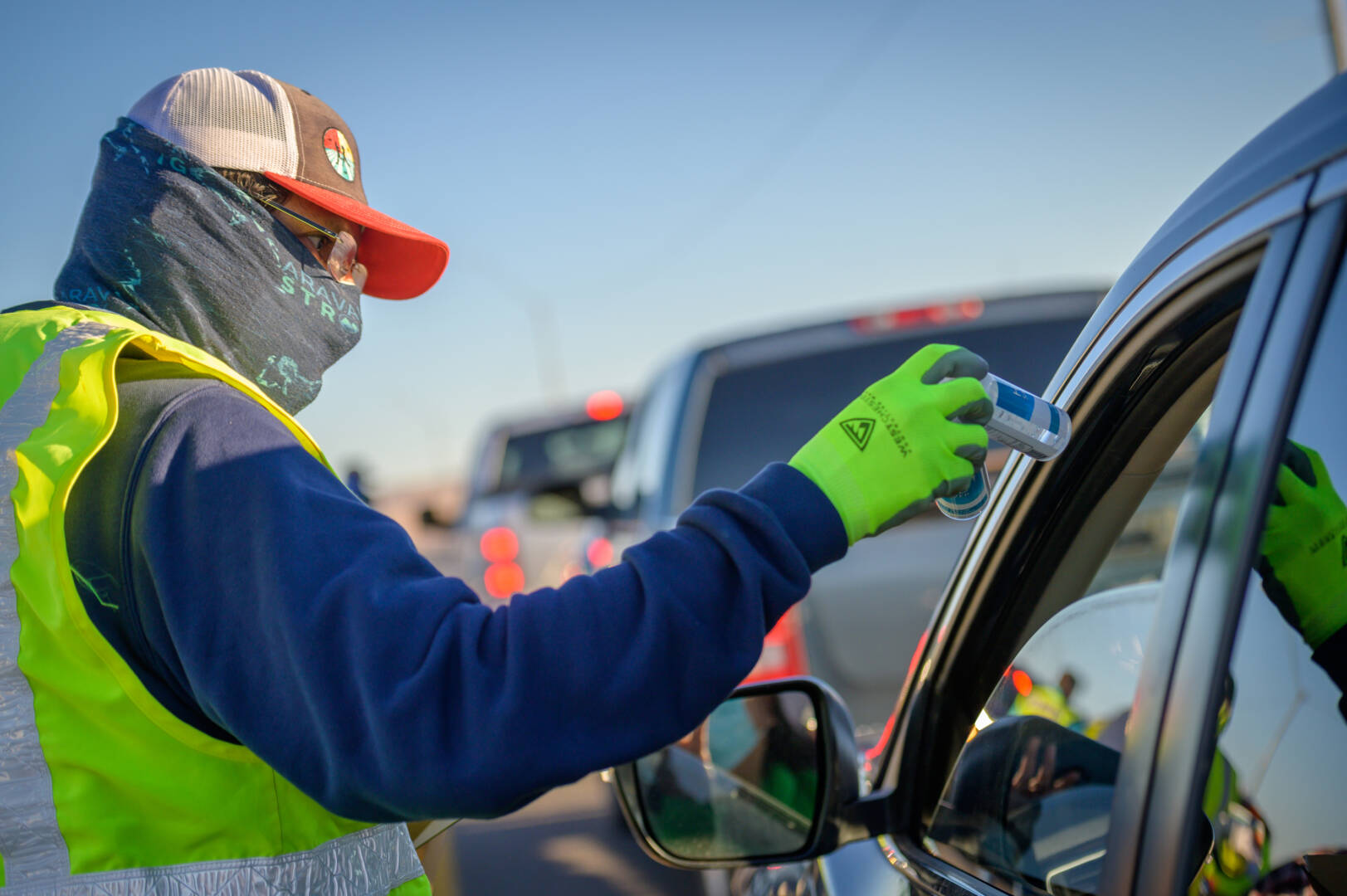
Thus, the need for COVID-19 checkpoints where President Nez and his team hand out documents about coronavirus prevention. The team also provides bottles of hand sanitizer and masks from World Vision.
“World Vision is a great partner to the Navajo Nation. All over the Navajo Nation during the summer, we were able to hand out food and hygiene kits, boxes to Navajo people throughout the nation,” says President Nez. World Vision’s been a partner for 20 years.
Fighting a pandemic together
As COVID-19 spread in spring 2020, food insecurity rose around the United States. World Vision responded with food donations. And throughout the pandemic, they’ve sent precious personal protective equipment (PPE) for first responders.
In autumn 2020, as infection rates rose again, World Vision’s U.S. Programs National Director Reed Slattery said, “All over the country, World Vision’s teams, over the next few weeks and months to come, will be getting as much personal protective equipment out the door to vulnerable communities.”
World Vision staff and volunteers in Fife, Washington, quickly built 800 personal protective equipment kits designated for the Navajo Nation. The orange-drawstring bags include masks, sanitizing spray, gloves, socks, and sanitizing wipes. Before shipping, warehouse staff gathered and prayed over the kits.
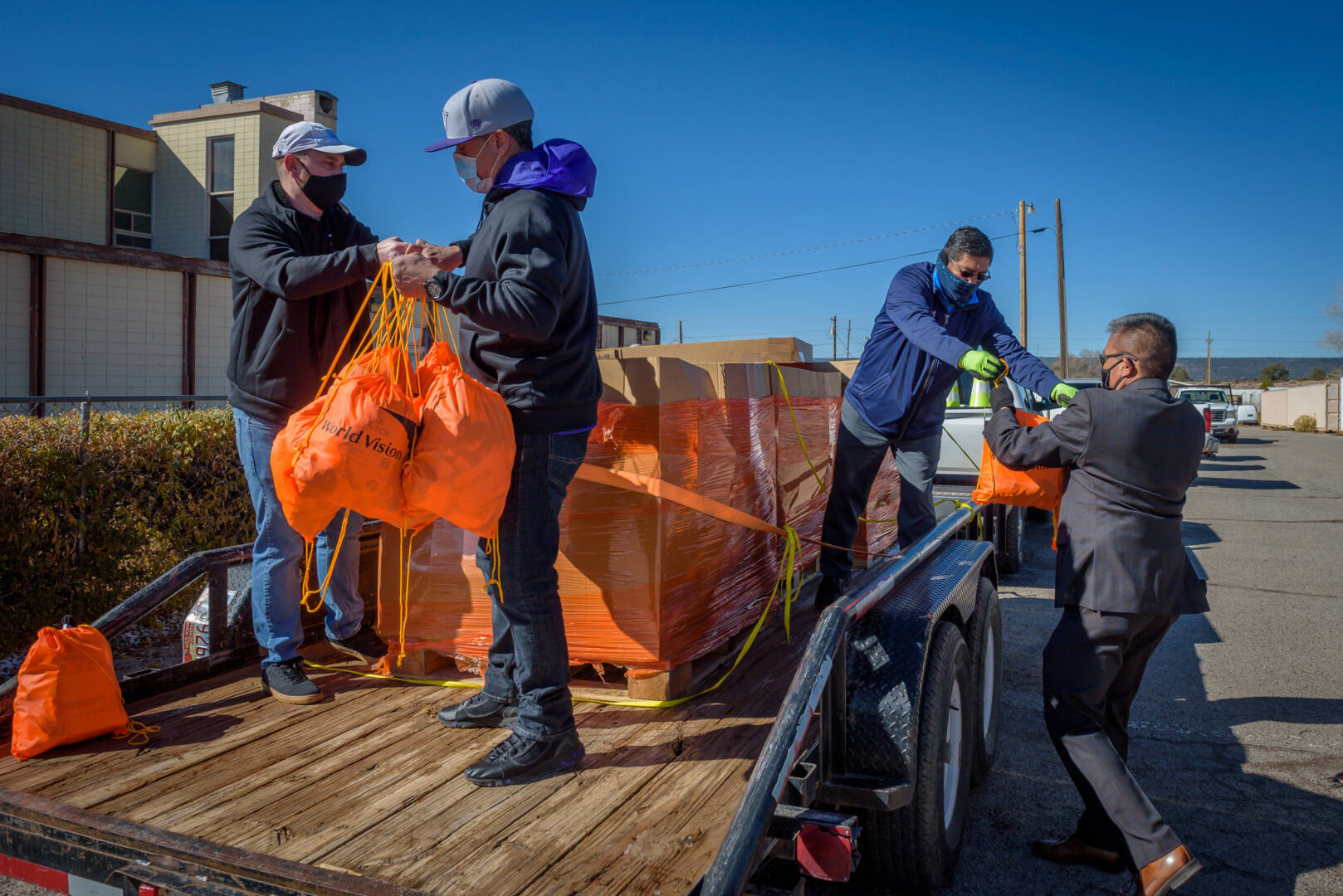
Faith to persist
On a crisp Arizona morning, Navajo Nation Vice President Myron Lizer distributes those personal protective equipment kits alongside staff from the president’s team and World Vision. They’re going out to workers from hospitals, the police department, the fire department, and emergency medical services.
“We want to express our gratitude to World Vision donors — our brothers and sisters — who provided these kits for us. You sent us a love message by living out your biblical principles to love your neighbor.”
Myron offers words of encouragement for those picking up supplies.
“We have to remain optimistic and never lose hope because eventually we will overcome this pandemic. Our God will heal and pull us through this time,” he says.
Long road to recovery
Sgt. Kara Tilden also leans on her faith during this ongoing crisis. She says, “We ask for prayers for the Navajo Nation to be able to survive through this calamity.”
A 22-year veteran of the Window Rock Police Department, Kara has never seen a threat greater to the Navajo Nation. When the pandemic first hit, Kara and her team scrambled to find protective gear.
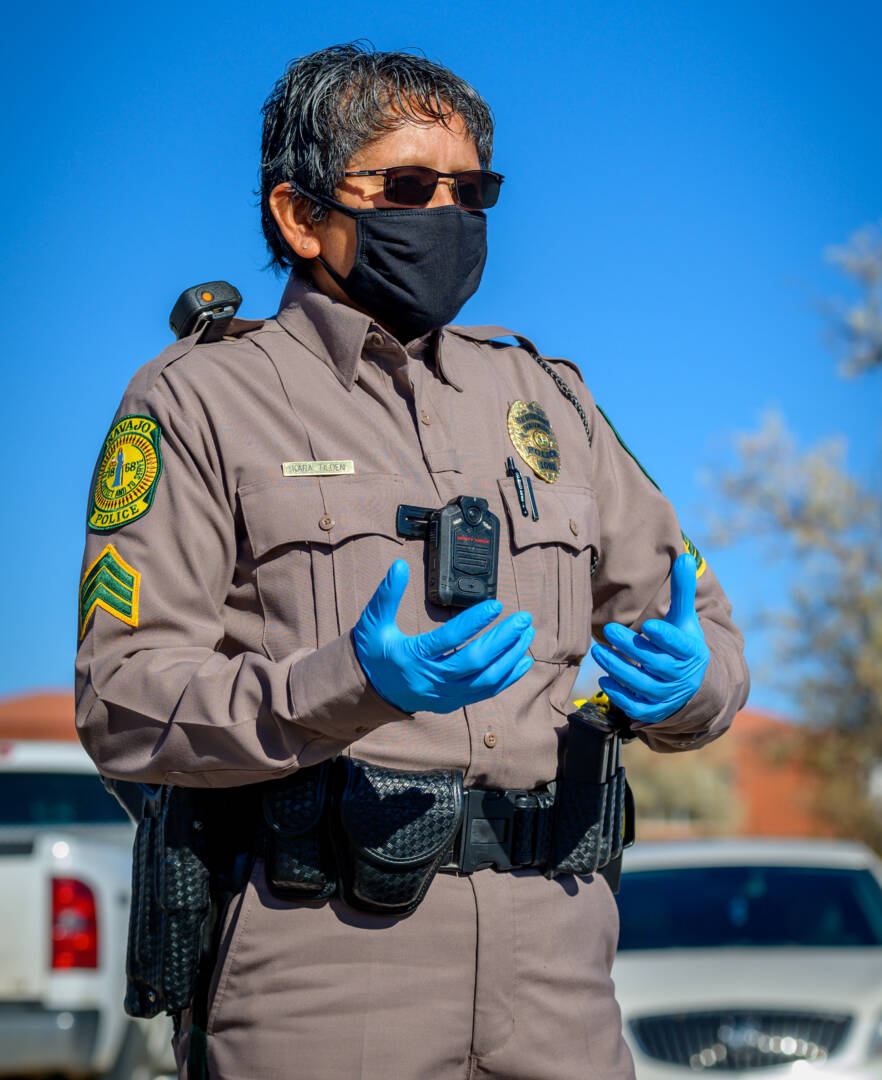
“We had to purchase our own from the beginning,” she says. But then donations began coming in, giving the first responders a cushion. “With this distribution here, it’s going to really help us again to have extra on hand again as we respond to calls out there.”
Kara fills up the back seat of her patrol car with bags to share with members of her team. They’ll be put to use right away.
They’re not only trying to protect themselves, but also their friends and co-workers. Kara’s lost friends to COVID-19. Some colleagues struggle to recover from a lingering weakness that leaves them unable to work.
“A few are so frail they’re unable to lift a weapon out of a holster,” she says. “The road to recovery is a long one.”
But despite the dangers, Kara continues patrolling 100 miles square miles per day during her shift.
She expresses her thanks for all those helping in the ongoing war against this disease: “I am so grateful to World Vision for helping the first responders who are in desperate need of protection.”
Stretched thin
Chris Kescoli, another frontline worker, manages the Navajo Nation’s Emergency Medical Services in Window Rock. He says, “We have been inundated with COVID-19 and it’s not letting up. We are stretched, stressed.”
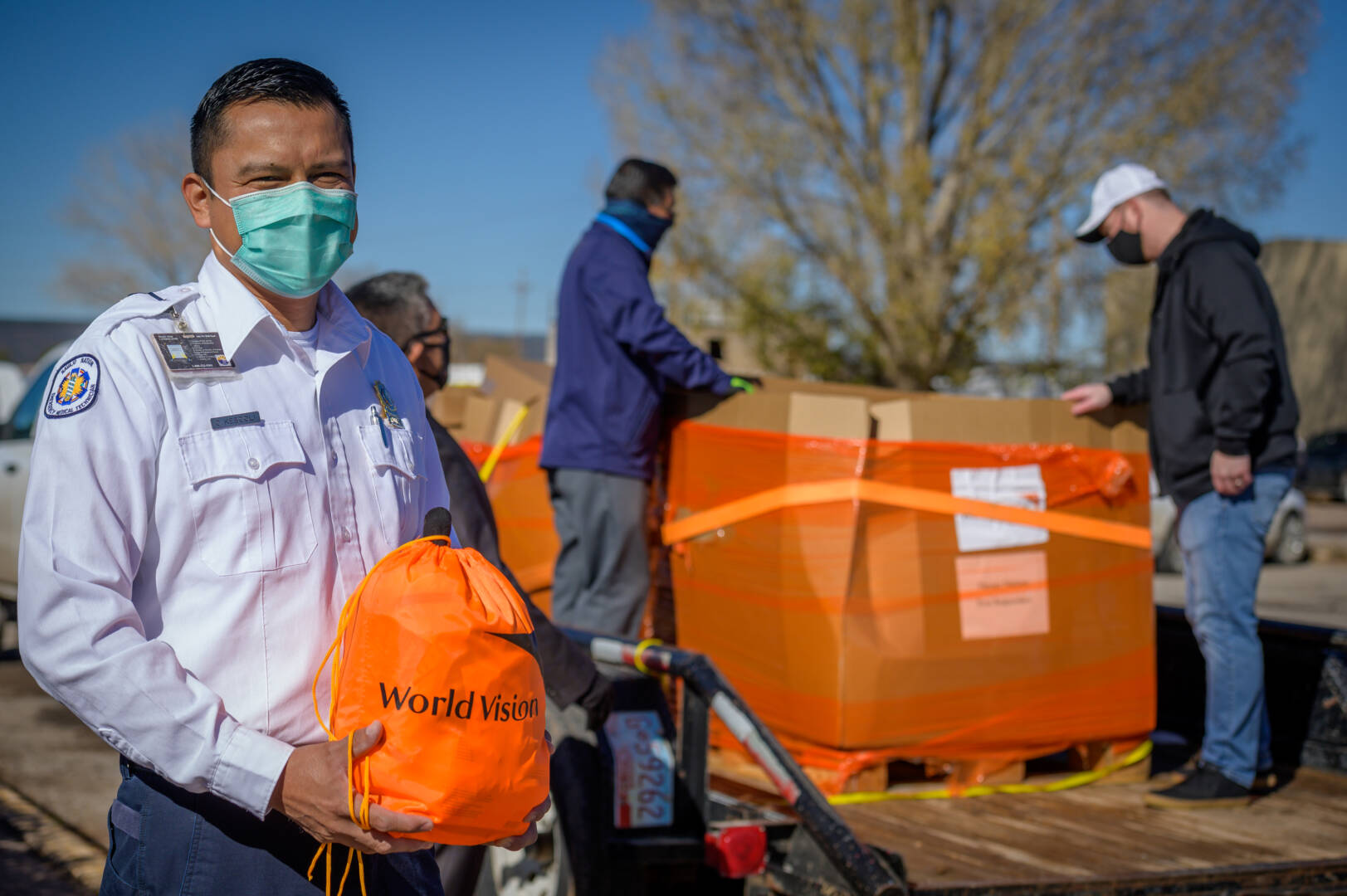
His department regularly logs 2,600 calls a year. After the pandemic’s onset, calls for ambulances are nonstop, he says.
Even though he feels that his team was prepared for the pandemic, they didn’t realize it would quickly overwhelm the healthcare system.
“Any [personal protective equipment] resource that becomes available we put that out to frontline personnel. That way they have that better protection,” Chris says.
In keeping with his word, he loads up the back of his truck with dozens of kits to distribute.
Fighting to keep family safe
Jennifer Collins, a lieutenant with the Navajo Nation Fire Department’s Station 12 in Fort Defiance, Arizona, echoes Chris’ words about the situation’s severity.
“We’re in crisis,” says the 28-year-old. “We’re hanging on by a thread and every day the situation gets more difficult. During this time, we are also in a shortage — in resources, in people, and in protective gear.”
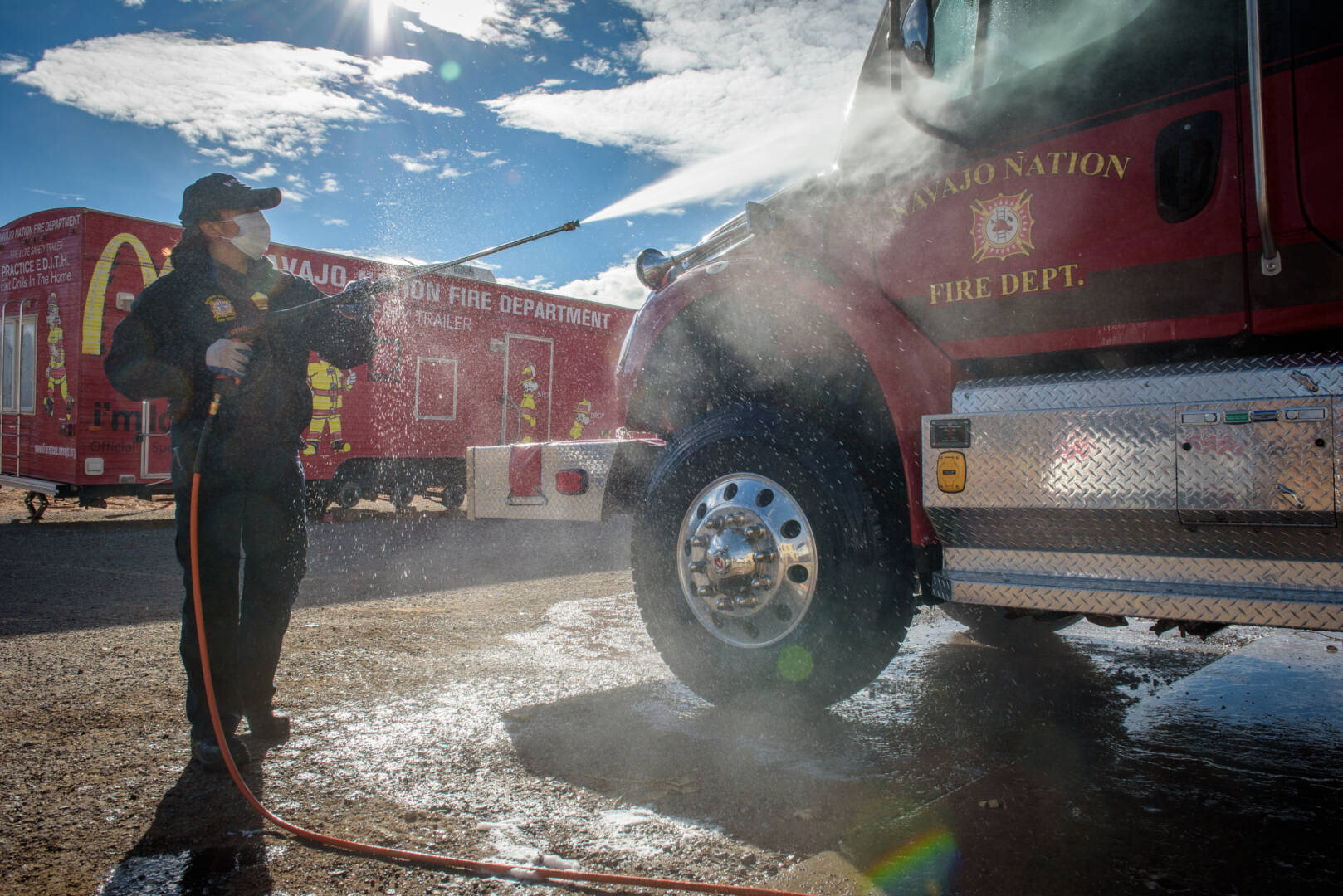
They take the threat of infection seriously. “When this pandemic hit, we treated it as a hazardous material,” she says. In fact, they spend a lot of time decontaminating supplies, gear, and vehicles.
When she finishes her shift, the single mother of four takes every precaution she can to keep her children — aged 3 to 7 — safe.
“Even before I get inside my house, I am peeling off layers, with the first layer placed in a plastic bag that stays outside,” Jennifer says.
She takes this extra care because as soon as she enters, her children bound toward her for hugs. “Once they hear the door opening up, that’s when the kids run straight to me [saying], ‘Mommy’s home!’”
She spends her evenings and weekends making sure her kids have completed their virtual schoolwork, fixing dinner, and collecting water for herself and her grandmother.
“It’s hard to maintain our lives at home and at work,” she says.
And so, when additional personal protective equipment arrives, she’s thankful. Jennifer says, “Everything in the World Vision kits will be used right away.”
Warriors’ weapons
There are challenges in the months ahead, but President Nez feels that his people can rise to meet them, especially with the supplies they’re receiving from donors.
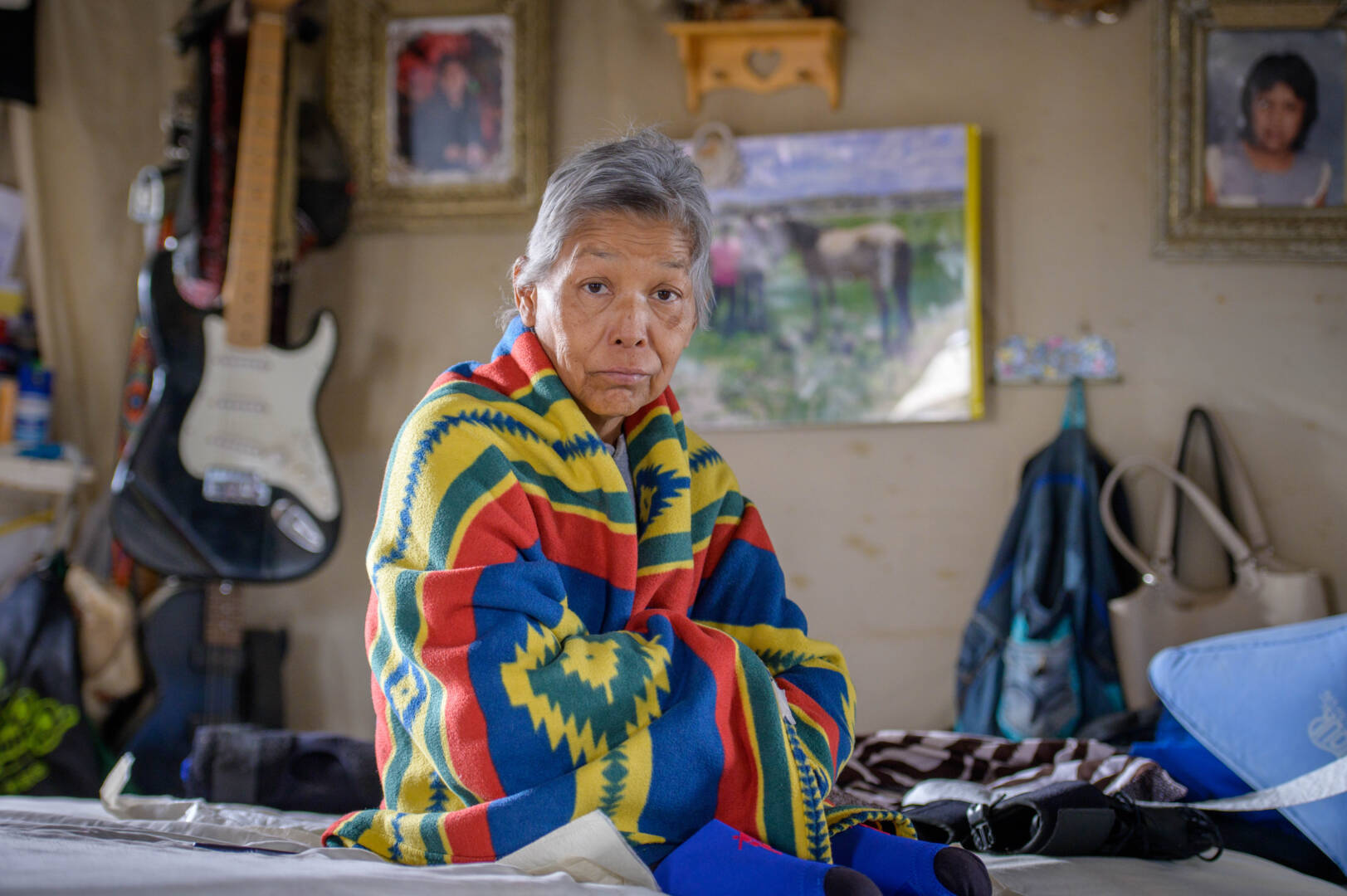
“I appreciate all the friends of Navajo Nation — including World Vision — that have been assisting us in giving relief and empowering our citizens to fight this virus,” President Nez says. “These are the weapons to fight off this monster that has swept into our communities.”
These weapons take the shape of hand sanitizer, gloves, and masks, but they provide safety and hope for battle-weary warriors.
Sevil Omer of World Vision’s U.S. staff contributed to this story.

